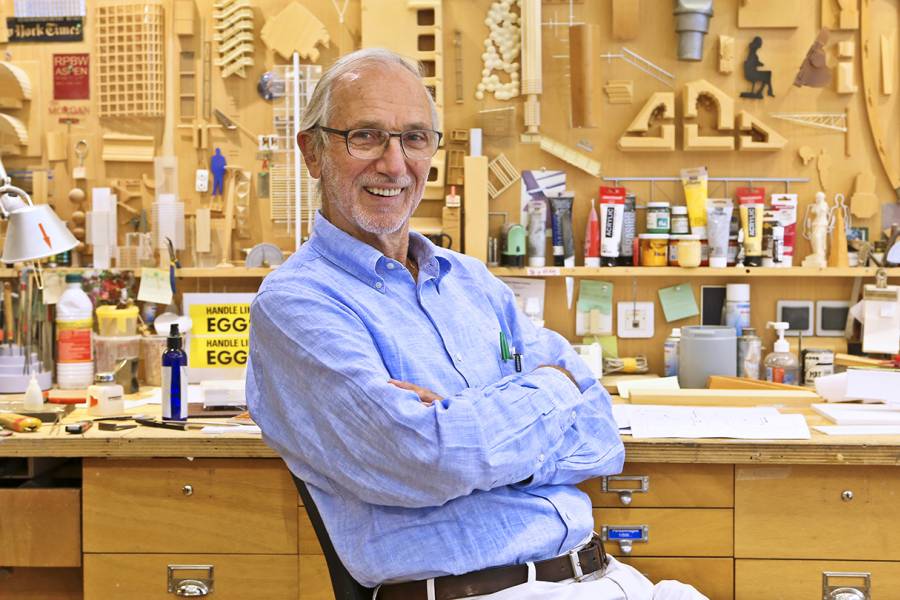- Name
- Dennis O'Shea
- dro@jhu.edu
- Office phone
- 443-997-9912
- Cell phone
- 410-499-7460
- X
- JHUmediareps
Renzo Piano, winner of architecture's most prestigious prizes and creator of masterpiece buildings on five continents, will design the headquarters of the new Stavros Niarchos Foundation Agora Institute at Johns Hopkins University.
Piano, whose landmark buildings include the Georges Pompidou Center in Paris, the Shard in London, the Stavros Niarchos Foundation Cultural Center in Athens, and the new Whitney Museum of American Art in New York, will lead the project with his Renzo Piano Building Workshop, based in Genoa, Italy. The interdisciplinary center to be housed in the new building is dedicated to strengthening democracy by improving civic engagement and civil discourse worldwide.
The 81-year-old Italian architect, whose career is the subject of a retrospective that opened last weekend at the Royal Academy of Arts in London, said he has "great respect" for what the university and the Stavros Niarchos Foundation seek to accomplish with the institute.
"I was attracted to the Johns Hopkins project for its humanistic nature and also because I have always been interested in making places for learning," Piano said. "I am very happy and honored to start this new adventure."
Piano and his firm will form a team for the project with a local firm, still to be determined. While a site at the university's Homewood campus has not been finalized, it is known that the institute building will house a director, 10 faculty members, 10 visiting scholars, and both graduate and undergraduate students. It will also accommodate a variety of public events, including an annual conference bringing together representatives of different viewpoints to examine contested public policy issues. There will also be lectures, symposiums, dinners, and performances.
"A visionary who understands the power of public space to foster conversation and create community, Renzo Piano is the ideal architect and artist to give physical form to the SNF Agora Institute," Johns Hopkins University President Ronald J. Daniels said.
"The SNF Agora Institute seeks to reinvent the ancient Athenian Agora for the 21st century," Daniels said. "The institute will serve as a forum for scholarly research, the robust exchange of ideas, and for sharing strategies to repair civic discourse and strengthen democracy in America and around the globe."
The work of Renzo Piano
Piano—who will join Daniels for a public conversation on architecture and society at 6 p.m. Monday on the university's Homewood campus—also is deeply committed to sustainable architecture and, like the university, envisions the SNF Agora Institute building as qualifying for LEED "green building" certification.
"All of us at the Stavros Niarchos Foundation are very happy to collaborate once again with the renowned architect and amazing human being, Renzo Piano, to provide the SNF Agora Institute with a home befitting of our common vision to contribute to a better society for all," said Andreas Dracopoulos, co-president of the Stavros Niarchos Foundation.
Piano's more than four-decade career includes both intimate and monumental-scale structures, the latter represented by such projects as Kansai International Airport in Osaka, Japan; the Aurora Place towers in Sydney, Australia; and the New York Times Building in New York. His museums include the Menil Collection in Houston, the Astrup Fearnley Museum of Modern Art in Oslo, the Nasher Sculpture Center in Dallas, and Zentrum Paul Klee in Switzerland. He has also designed a wing of the Art Institute of Chicago and expansions of the Los Angeles County Museum of Art, the High Museum of Art in Atlanta, the Kimbell Art Museum in Fort Worth, and the Morgan Library in New York.
Piano has built acclaimed concert halls and theaters in Italy, mixed-use office towers and residential developments in the United Kingdom, a courthouse in Paris, a private home in Colorado, and the City Gate and Parliament on Malta. He and his colleagues created a cultural center for indigenous people in New Caledonia in the southwestern Pacific Ocean. Construction of a children's surgical hospital is underway in Entebbe, Uganda.
Video credit: TED
In 1998, he received the Pritzker Prize, commonly regarded as architecture's most important award. The jury's citation compared his "intellectual curiosity and problem-solving techniques" to those of two "earlier masters of his native land, Leonardo da Vinci and Michelangelo." He has received the Royal Gold Medal of the Royal Institute of British Architects, the Gold Medal of the American Institute of Architects, the Kyoto Prize, the Praemium Imperiale, and the Sonning Prize. He is a former UNESCO goodwill ambassador.
The SNF Agora Institute, launched in 2017 with a $150 million gift from the Stavros Niarchos Foundation, will be both an academic and public forum, drawing its inspiration from the Agora of ancient Athens, which was a hub of conversation and debate and the center of the city-state's democratic governance. It will bring together experts from fields as diverse as political science, psychology, neuroscience, philosophy, ethics, sociology, and history to address ways to improve decision-making and civic discourse, and design and test mechanisms for strengthening democracy through dialogue and social engagement.
The institute will examine problems with modern democratic discourse, including how citizens are informed, how they debate, and how they engage with one another and with government. It will recruit public and private players and technical experts to experiment with real-world strategies to ease partisan division and strengthen civic dialogue.
Posted in University News, Politics+Society
Tagged architecture, snf agora institute










